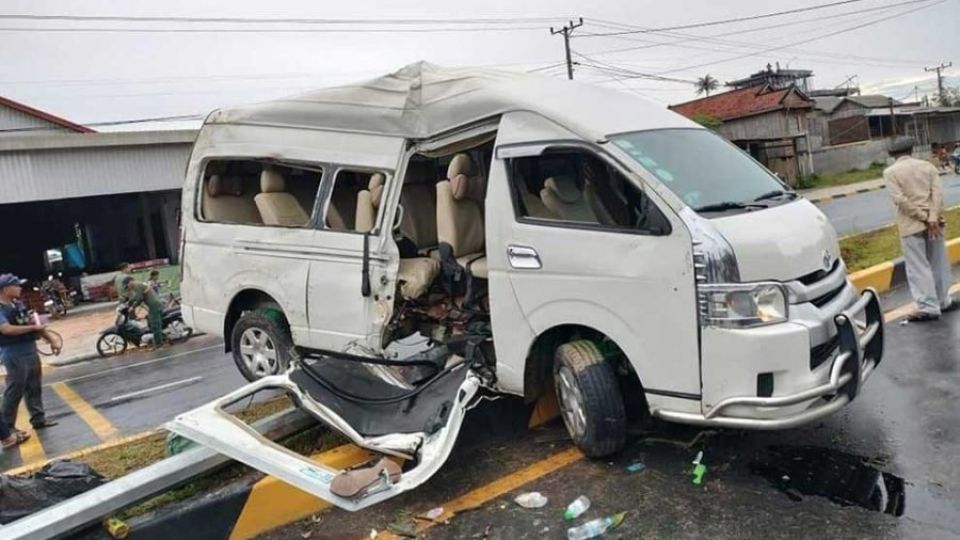December 5, 2023
PHNOM PENH – The government’s 10-year plan to reduce the annual number of traffic accidents by at least 50 per cent could be difficult to achieve, according to Deputy Prime Minister and Minister of Interior Sar Sokha. The comment comes as roadway fatality tolls in the Kingdom remain high.
Sokha, also chair of the National Road Safety Committee (NRSC), made the remarks during the dissemination of the National Plan for the Decade of Action for Road Safety 2021-2030 on November 30 at the ministry.
He said that although deaths from traffic accidents have decreased this year, the rate remains high. The number of deaths in the first 11 months of 2023 totalled 1,431, a decrease of 235 from the 1,676 casualties recorded in the same period in 2022.
“We have one month left, but it is estimated that between 100 and 110 people will likely die in traffic accidents. Therefore, for this year, we can reduce the fatalities by more than 100 people. If we multiply 100 people by 10 years, we can only save about 1,500 people. However, our plan aims to reduce fatalities by at least 50 per cent,” he said.
He emphasised that the plan to reduce accidents is not impossible, albeit somewhat complicated.
Sokha suggested exploring the option with the Ministry of Education, Youth and Sport to incorporate road-related topics into the curriculum, such as including traffic signs in the education ministry’s textbooks.
He highlighted the importance of traffic laws as a key factor in reducing traffic accidents, in addition to road conditions and driver behaviour.
He urged capital and provincial governors to increase their vigilance, noting that 82 per cent of fatal road incidents involve motorcyclists. The situation, he said, requires stricter enforcement of traffic laws, clearer signage and education on law compliance, including mandatory wearing of helmets while driving.
“Fifty-four percent of the fatalities occur at night, and most traffic accidents at night involve alcohol, leading to the loss of lives, either of others or the driver themselves. Therefore, I urge the Ministry of Public Works [and Transport] and the interior ministry to impose severe penalties on those who consume alcohol and dangerous drivers who cause the loss of lives,” he said.
He called upon all provincial capitals, governors and police chiefs to intensify their efforts in two key areas: restricting the use of alcohol and controlling explosive weapons.
The national road safety plan, the government’s second initiative to enhance the efficiency and sustainability of traffic safety, particularly in reducing accidents, faces three challenges: limited adherence of traffic laws by drivers and road and vehicle safety.
The first effort, from 2010 to 2020, saw a reduction in accidents by about 62 per cent, according to a February 8 report from the National Police.
Kong Ratanak, a traffic expert, personally shares Sokha’s view that realising the goals of the plan may be challenging.
“It is difficult to achieve because we do not have sufficient resources; the resources of our law enforcers and plans are still limited. Additionally, a major problem is the lack of public participation, as we have observed over the years that people do not adhere to road traffic laws,” he said.
According to Ratanak, although the plan may not be fully implemented, having it as a roadmap, in alignment with the government’s commitment, necessitates the involvement of stakeholders. This includes allocating a budget for implementing the plan, such as for road maintenance, disseminating traffic laws and raising awareness about the detrimental effects of accidents.
The interior minister also directed police across the country to rigorously enforce regulations against trucks with curtains and black sunscreen stickers on the front.
“I’ve directed capital police to enforce bans on curtains and stickers on truck windows, especially on front windscreens, except for tax-related stickers,” Sokha stated.
Phnom Penh municipal police spokesman Sam Vichheka reported on December 3 that police chief Chuon Narin initiated a plan to enforce these measures.
The focus is on preventing the use of black window screens and curtains on trucks, a practice commonly seen in soil-carrying trucks.
“On top-level orders, we will execute this task,” he added.
Asia Injury Prevention Foundation’s (AIP) country director Kim Pagna supported the initiative, highlighting the role of sunshades in road accidents.
He suggested the ministry provide specific guidelines on sticker and curtain use and called for police to engage truck owners in compliance efforts.
“I encourage a patrolling team to inspect trucks with stickers or curtains that contravene road traffic laws and stop them [in a safe location],” he advised.
The report identified human factors as the primary cause of traffic accidents, contributing to 96.8 per cent of incidents, followed by vehicular and road factors.
Studies by the Ministry of Public Works and Transport and the UN Development Programme (UNDP) in 2020 estimated that road accidents cost the Kingdom approximately $379.2 million.


